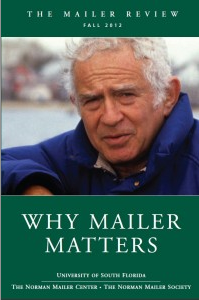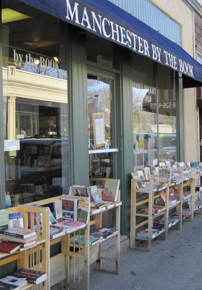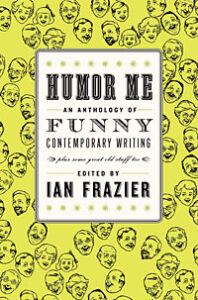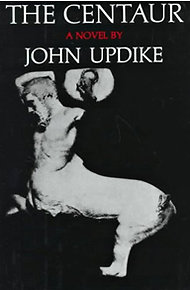 Society member Bob Batchelor, who recently accepted the volunteer position of Marketing and Media Director for The John Updike Childhood Home, had an essay published in The Mailer Review 6:1 (2012): 129-44, titled “Mailer and Updike: Probing American Culture as Writers and Celebrities.”
Society member Bob Batchelor, who recently accepted the volunteer position of Marketing and Media Director for The John Updike Childhood Home, had an essay published in The Mailer Review 6:1 (2012): 129-44, titled “Mailer and Updike: Probing American Culture as Writers and Celebrities.”
Author Archives: James Plath
Philly journalist thinks the Reading baseball team ought to be named the Rabbits
 Philly journalist Will Bunch thinks that the Reading baseball team would have been better renamed in honor of Updike’s most famous character. But of course not all readers agree. Here’s the opinion piece from Philly.com. Thanks to Jack De Bellis for calling it to our attention.
Philly journalist Will Bunch thinks that the Reading baseball team would have been better renamed in honor of Updike’s most famous character. But of course not all readers agree. Here’s the opinion piece from Philly.com. Thanks to Jack De Bellis for calling it to our attention.
Bookseller offers volumes from Updike’s personal collection
 Mark Stolle, who owns the used bookstore Manchester By the Book in Manchester, Mass., writes that he purchased books from John Updike periodically. He kept most of them at the house but is now bringing a few to the store to sell. Most are inscribed to Updike from well-known authors. If anyone is interested they can contact him by email (Manchesterbythebook@gmail.com) or phone (978-525-2929). Some of you may have spoken with him in Boston, as he attended our conference.
Mark Stolle, who owns the used bookstore Manchester By the Book in Manchester, Mass., writes that he purchased books from John Updike periodically. He kept most of them at the house but is now bringing a few to the store to sell. Most are inscribed to Updike from well-known authors. If anyone is interested they can contact him by email (Manchesterbythebook@gmail.com) or phone (978-525-2929). Some of you may have spoken with him in Boston, as he attended our conference.
A new in-depth scholarly review of Terrorist surfaces
Amien Kacou has reviewed Updike’s “Terrorist” for Perspectives on Terrorism: a journal of the Terrorism Research Initiative. It’s a lengthy, scholarly article that the editor notes “takes a research article format, which is a nontraditional approach; it offers a thesis, based on an extended, footnoted philosophical study.” It appears online in Vol. 6, No. 4-5 (2012).
Here’s the link, with thanks to Larry Randen for calling it to our attention.
Rabbit, Run included in Banned Books Trading Card Project
 Updike once remarked that he liked to think of his books being discovered by a young boy somewhere in Kansas, and that looks like a real possibility, since the Lawrence Public Library in Lawrence, Kansas, seems to be a firm believer in fighting censorship. This year they’ve “assembled sets of seven cards designed by local artists and inspired by banned books or authors.” Updike’s Rabbit, Run was one of the seven. You can buy the sets by mail. This item comes from Jack De Bellis, who probably has already ordered his set.
Updike once remarked that he liked to think of his books being discovered by a young boy somewhere in Kansas, and that looks like a real possibility, since the Lawrence Public Library in Lawrence, Kansas, seems to be a firm believer in fighting censorship. This year they’ve “assembled sets of seven cards designed by local artists and inspired by banned books or authors.” Updike’s Rabbit, Run was one of the seven. You can buy the sets by mail. This item comes from Jack De Bellis, who probably has already ordered his set.
Here’s the link.
A footnote on Updike’s “A Mild Complaint” surfaces
 Updike’s short story “A Mild Complaint” appeared in Ian Frazier’s Humor Me: An Anthology of Funny Contemporary Writing (Plus Some Great Old Stuff, Too) (Ecco Press, 2010) with this footnote, which appears in the author’s introduction:
Updike’s short story “A Mild Complaint” appeared in Ian Frazier’s Humor Me: An Anthology of Funny Contemporary Writing (Plus Some Great Old Stuff, Too) (Ecco Press, 2010) with this footnote, which appears in the author’s introduction:
“Also, unconnected to anything, here’s a note, just FYI: The John Updike piece, “A Mild Complaint,” which concludes Part I, was famous at the New Yorker as the piece that the magazine held on to the longest before it was published. Updike wrote the piece, and the magazine bought it, in the mid-1950s, when he was a young man. For inscrutable reasons the New Yorker then kept the piece for twenty-some years and finally ran it in the 1970s [sic, actually April 19, 1982], when Updike was in his middle years. The piece is included here as a testament to the resilience of literature, and as a wave to Mr. Updike, wherever in the afterlife he may be” (xi-xii).
Frazier’s remarks can be found in context at this link. Thanks to member Larry Randen for passing it along.
De Bellis’ new book available for pre-order
Jack De Bellis’ new book, John Updike’s Early Years (Lehigh University Press, cloth, 188pp), will be published in January 2013 and is now available for pre-order through Rowman & Littlefield.
Here’s the link, which includes an extensive description.
Editorial touts Updike home purchase as first step toward literary tourism
An editorial published today (September 3) in the Reading Eagle, “Sale of Updike home a promising development for Berks,” touts the purchase as “a first step toward encouraging literary tourism in our area” and calls for people who knew Updike to consider donating objects to the museum and other institutions to consider ways they can use their ties to Updike to help attract visitors to the area.
Updike Society president James Plath will be a featured speaker at the Alvernia Literary Festival on October 8, and he will use that visit to Reading to meet with various parties to ensure that the Society continues to move forward on this project in ways that are beneficial to the community.
Here’s the full editorial.
Camden House is now accepting pre-orders for “Becoming John Updike”
Camden House has begun accepting pre-orders for Becoming John Updike: Critical Reception, 1958-2010, by Laurence W. Mazzeno.
The book provides a comprehensive overview of the journalistic and academic response to Updike’s writings.
Mazzeno, President Emeritus of Alvernia University, is a member of the Society. Here’s the link. No cover art is available yet.
NY Times Book Review Editor recommends The Centaur as a “school book”
 In an article titled “Times Staffers Recommend ‘School Books,'” by John Williams, Sam Tanenhaus, the Times Book Review Editor, picked The Centaur as his recommendation for “books that are set in or around schools.”
In an article titled “Times Staffers Recommend ‘School Books,'” by John Williams, Sam Tanenhaus, the Times Book Review Editor, picked The Centaur as his recommendation for “books that are set in or around schools.”
Here’s the link to the story, which was posted on August 24, 2012.
